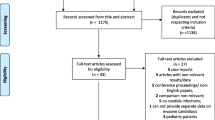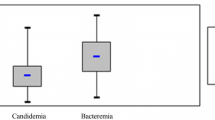Abstract
Procalcitonin (PCT) has been described as a marker of bacterial sepsis. However, little is known of its diagnostic value in fungal infections. We calculated the sensitivity of PCT for detection of invasive fungal infections (IFI) by analyzing 55 episodes of proven or probable IFI (three in our series, 52 reported in the recent literature). In the early phase of IFI, PCT was elevated in fewer than half of invasive candidiasis episodes and in only one patient (5.3%) with invasive aspergillosis. Due to low sensitivity and specificity, PCT adds little to the diagnosis of IFI.
Similar content being viewed by others
References
Ascioglu S, Rex JH, de Pauw B, Bennett JE, Bille J, Crokaert F, Denning DW, Donnelly JP, Edwards JE, Erjavec Z, Fiere D, Lortholary O, Maertens J, Meis JF, Patterson TF, Ritter J, Selleslag D, Shah PM, Stevens DA, Walsh TJ, on behalf of the Invasive Fungal Infections Cooperative Group of the European Organization for Research and Treatment of Cancer; Mycoses Study Group of the National Institute of Allergy and Infectious Diseases (2002) Defining opportunistic invasive fungal infections in immunocompromised patients with cancer and hematopoietic stem cell transplants: an international consensus. Clin Infect Dis 34(1):7–14
Beaune G, Bienvenu F, Pondarre C, Monneret G, Bienvenu J, Souillet G (1998) Serum procalcitonin rise is only slight in two cases of disseminated aspergillosis. Infection 26(3):168–169
Blijlevens NM, Donnelly JP, Meis JF, De Keizer MH, De Pauw BE (2000) Procalcitonin does not discriminate infection from inflammation after allogeneic bone marrow transplantation. Clin Diagn Lab Immunol 7(6):889–892
Christofilopoulou S, Charvalos E, Petrikkos G (2002) Could procalcitonin be a predictive biological marker in systemic fungal infections? Study of 14 cases. Eur J Intern Med 13(8):493–495
Delevaux I, Andre M, Colombier M, Albuisson E, Meylheuc F, Begue RJ, Piette JC, Aumaitre O (2003) Can procalcitonin measurement help in differentiating between bacterial infection and other kinds of inflammatory processes? Ann Rheum Dis 62(4):337–340
Eloy O, Vauloup C, Therond P, Pina P, Allouch P, Pangon B, Bedos J-P, Ghnassia J-C (2001) Intérêt du dosage de la procalcitonine dans les infections profondes fongique à Candida. Ann Biol Clin 59(4):502–505
Fleischhack G, Cipic D, Juettner J, Hasan C, Bode U (2000) Procalcitonin—a sensitive inflammation marker of febrile episodes in neutropenic children with cancer. Intensive Care Med 26 [Suppl 2]:S202–S211
Gerard Y, Hober D, Petitjean S, Assicot M, Bohoun C, Mouton Y, Wattre P (1995) High serum procalcitonin level in a 4-year-old liver transplant recipient with disseminated candidiasis. Infection 23(5):310–311
Giamarellos-Bourboulis EJ, Grecka P, Poulakou G, Anargyrou K, Katsilambros N, Giamarellou H (2001) Assessment of procalcitonin as a diagnostic marker of underlying infection in patients with febrile neutropenia. Clin Infect Dis 32:1718–1724
Hambach L, Eder M, Dammann E, Schrauder A, Sykora K-W, Dieterich C, Kirschner P, Novotny J, Ganser A, Hertenstein B (2002) Diagnostic value of procalcitonin serum levels in comparison with C-reactive protein in allogeneic stem cell transplantation. Haematologica 87(6):643–651
Huber W, Schweigart U, Bottermann P (1997) Failure of PCT to indicate severe fungal infection in two immunodeficient patients. Infection 25(6):377–378
Jantunen E, Piilonen A, Volin L, Parkkali T, Koukila-Kähkölä P, Ruutu T, Ruutu P (2000) Diagnostic aspects of invasive aspergillus infections in allogeneic BMT recipients. Bone Marrow Transplant 25:867–871
Karzai W, Meier-Hellmann H, Reinhart K (1998) Procalcitonin—an indicator of sepsis. In: Vincent J-L (ed) Yearbook of intensive care and emergency medicine. Springer, Berlin Heidelberg New York, pp 247–256
Oczenski W, Fitzgerald RD, Schwarz S (1998) Procalcitonin: a new parameter for the diagnosis of bacterial infection in the peri-operative period. Eur J Anaesthesiol 15:202–209
Pahlke K, Oberhoffer M, Karzai W, Meier-Hellmann A, Reinhart K (1997) Procalcitonin—features of a new parameter in severe bacterial infections and sepsis. Intensivmed 34:381–387
Rau B, Steinbach G, Gansauge F, Mayer JM, Grünert A, Beger HG (1997) The potential role of procalcitonin and interleukin 8 in the prediction of infected necrosis in acute pancreatitis. Gut 41(6):832–840
Svaldi M, Hirber J, Lanthaler AI, Mayr O, Faes S, Peer E, Mitterer M (2001) Procalcitonin-reduced sensitivity and specificity in heavily leucopenic and immunosuppressed patients. Br J Haematol 115(1):53–57
von Heimburg D, Stieghorst W, Khorram-Sefat R, Pallua N (1998) Procalcitonin—a sepsis parameter in severe burn injuries. Burns 24(8):745–750
Acknowledgements
We are indebted to Dr. Nicole M. Blijlevens, Dr. Sofia Christofilopoulou, Dr. Gudrun Fleischhack, Dr. Helen Giamarellou and Dr. Wolfgang Huber for providing additional data on their published cases.
Author information
Authors and Affiliations
Corresponding author
Rights and permissions
About this article
Cite this article
Dornbusch, H.J., Strenger, V., Kerbl, R. et al. Procalcitonin—a marker of invasive fungal infection?. Support Care Cancer 13, 343–346 (2005). https://doi.org/10.1007/s00520-004-0721-3
Received:
Accepted:
Published:
Issue Date:
DOI: https://doi.org/10.1007/s00520-004-0721-3




